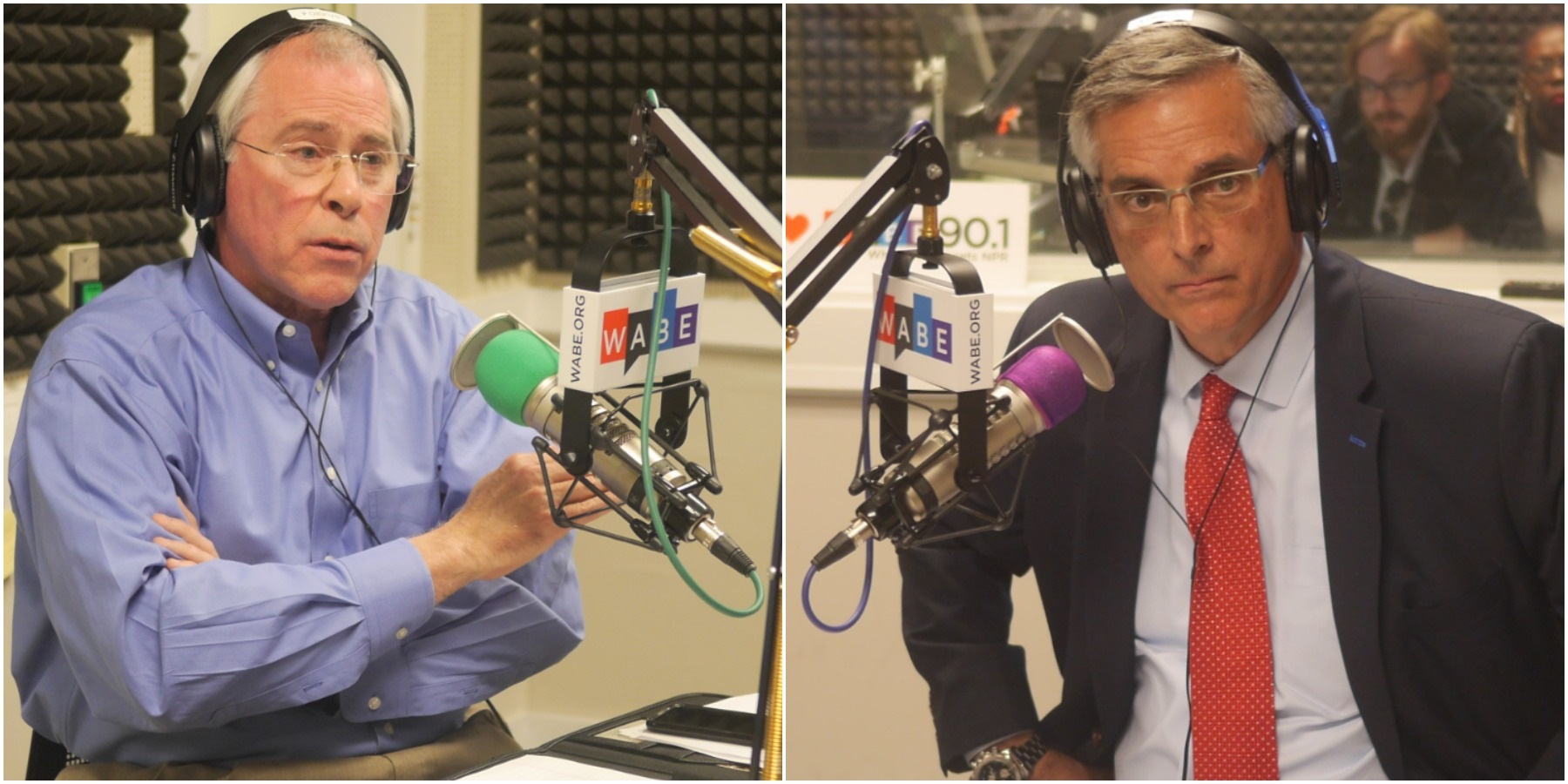Voting Access Takes Center Stage In Tuesday’s Georgia Runoff

In Tuesday’s runoff election, Democrat John Barrow and Republican Brad Raffensperger are vying to be Georgia’s next secretary of state. Neither candidate won more than 50 percent of votes on Nov. 6.
Emilia Brock / WABE
Georgia’s voters have one more chance to make their voices heard about the state’s election infrastructure.
Tuesday’s runoff election for Georgia secretary of state pits Republican state Rep. Brad Raffensperger against former Democratic congressman John Barrow. Neither candidate won more than 50 percent of votes on Nov. 6.
Raffensperger has support from President Donald Trump, while Barrow is endorsed by former gubernatorial candidate Stacey Abrams.
At stake in their runoff is the ability to reshape the state’s election system, which came under a national microscope during the recent race for governor between Abrams and Republican Secretary of State — now governor-elect — Brian Kemp.
Raffensperger has defended how Georgia canceled the registrations of hundreds of thousands of voters; he says he’ll focus on election integrity and making sure only legal citizens can cast ballots.
Barrow says changes are needed. He told The Associated Press in an interview that Georgia does a “pretty good job of keeping people from cheating,” but a “lousy job of making it easier for folks to vote.”
Following Kemp’s victory, a political group backed by Abrams filed a federal lawsuit saying election officials “grossly mismanaged” the 2018 election, depriving some citizens, particularly low-income people and people of color, of their right to vote.
It’s one of several recent lawsuits challenging Georgia’s handling of elections that the next secretary of state must respond to.
Changes will likely include replacing the state’s aging electronic touchscreen voting machines that leave no auditable paper trail. Both candidates say they prefer a system with a paper record.
And both candidates say they will work to support county officials while coordinating the patchwork of 159 counties that sometimes interpret election law and administrative guidance in slightly different ways.
Another major question facing the candidates is whether either would step aside from overseeing an election they were running in. Kemp was criticized for not resigning while overseeing his own election for governor. Barrow has said he would either resign or recuse himself from official duties as the state’s chief elections officer if he were to run; Raffensperger has said that he doesn’t plan to seek higher office.
But one of the most divisive state issues is also being played out at the national level: How to strike the right balance between access to the polls and integrity of the polls.
Georgia has been aggressive in cleaning the names of “inactive” voters from its rolls — called “voter purges” by critics.
An analysis by The Associated Press found that more than 1.4 million registrations were canceled in Georgia since 2012, with nearly 670,000 cancelled in 2017 alone. Many were from people who moved or died, but others were removed mistakenly, or for simply not voting in several election cycles.
Barrow said Georgia is good at preventing fraudulent voting but must do more to expand access.
“We should be making it as easy to vote for people as possible, without in any way making it possible for someone to cheat,” Barrow said.
Barrow pointed to long lines at some polls, and people who were purged without being informed about it.
“There are all kinds of stories that have come out during the last election of all kinds of little things that need to be fixed,” Barrow said.
He specifically criticized the way mass cancellations of registrations were handled.
“We ought to put at least as much effort in notifying someone that they’re about to be kicked off the voting rolls as we give to somebody before we turn off their water,” Barrow said. “And that involves a lot more than just one postcard.”
Calls and text messages sent to Raffensperger’s campaign spokesman by the AP were not returned. The GOP candidate also pulled out of the runoff race’s only televised debate, citing a scheduling conflict.
But in interviews and previous debates, Raffensperger has defended Georgia’s maintenance of voting rolls and said he would keep the focus on election integrity and making sure only legal citizens can cast a ballot.
During a recent interview on the Shelley Wynter Show on Atlanta radio station WYAY, Raffensperger said he saw no malfeasance in the way Georgia elections were handled. But he said his administration would analyze what could be done to fix any mistakes for the next election.
“When I listen to what has gone on this election, there has been an awful lot of hyperbole. People have just spun things up out of whole cloth in many instances,” Raffensperger said.
Barrow served in the U.S House from 2005 to 2015. His tenure there required two moves, as GOP lawmakers twice redrew his district boundaries. He was finally defeated in the GOP’s midterm sweep in 2014.
Raffensperger is owner and CEO of an engineering design firm. He served as a local elected official in Johns Creek, before serving two terms in the Georgia state House from the same area beginning in 2015.








